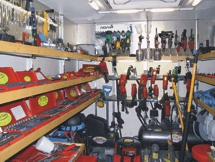IDG Tools’ Warehouse Relies on Datalogic Kyman

The Swedish company Industriverktyg IDG Tools AB sells tools in a somewhat unique way. Driving around with exhibition buses in Sweden, Norway, Finland, Denmark, Poland and Italy, they display their product range and take orders using the Kyman™.
The company owns more than 80 buses and have an equal amount of sales people. Their offices and warehouse are situated near the airport in Stockholm, not far from the harbor where they ship their goods to Finland and Poland. Products to their Swedish and Norwegian customers are transported over night, and the orders are delivered to most of the addresses as soon as the day after the order is taken.
IDG Tools AB’s product range is made up almost solely of their own well-known trademark, IDG Tools® (Industrial Development Group). The company has an extensive product range, most of which can be found on exhibition buses.
Datalogic Mobile’s Kyman™ in the warehouse
IDG Tools uses the mobile computer Kyman™ from Datalogic Mobile in their warehouse and has done so for about a year. The warehouse consists of 4000-4500 items and 6500 places for pallets. Kyman™ is used to make the picking procedure more effective and simpler. Previously, they used a mobile computer of another brand, which they had to replace since it did not meet their needs. The reason they chose Kyman™ was due to a recommendation by Sundit – the supplier of their ERP system. IDG Tools gave a list of requirements to Sundit; their main requirements being flexibility, color screen and reliable on-line communication. Sundit then turned to Datalogic Mobile Partner, for the right product. Datalogic Mobile’s Kyman™ filled these needs. In addition, it is ergonomic, suits the hand, has a sharp screen and is very fast. For all of these reasons, IDG has been very satisfied with their choice.
IDG Tools’ warehouse is equipped with a radio solution from Cisco with several access points on the premises, so the users can work with the mobile computer wherever they are. Thanks to the integrated TelNet client from Datalogic Mobile and the application made by Sundit, they are able to communicate in real time with the ERP system Visma. The TelNet client from Datalogic Mobile (DL-TCL™) is included in all the latest models of Datalogic’s mobile computers.
How the orders are picked
Approximately 99% of all new sales are made on the exhibition buses. The order is received manually and faxed to the order registration department, where it is registered in the ERP system, Visma. It is then displayed on the Kyman™ mobile computer. The order picker then picks the goods in the same order that the articles show up on the screen. This is also the most effective way since the articles are displayed in the same manner that they are placed in the warehouse. The order picker reads the shelf and aisle numbers where the articles are placed. As the items are picked, the barcode on each item is scanned, and the quantity to pick is verified. Up to four orders can be picked at the same time. Each one is displayed in a different color so that they know which order they are working on. Those with a blue background color are placed in blue boxes; those with a white background color are placed in white boxes, just to make sure that the orders are correctly picked. When the last item is picked, the order is automatically updated in Visma and ready to pack, ship, invoice etc. On average between 950-1100 orders are picked each day.
A real advantage being online
Jens Forsberg, IT-manager at IDG Tools says, “We have saved a lot by changing this system. Mainly time, since we now can pick several orders at the same time, and the mobile computer Kyman™ processes the orders faster than what the previous computer did. Since we are online all the time, we always have updated information. This means that if, for example, an article is moved, we would see the information at the very same moment.”
The warehouse staff works between 7:00 and 16:30 Monday through Friday. The batteries in the mobile computers last a full working day, although most of the workers put them in the docking stations to charge the batteries during their lunch break. Otherwise they charge them overnight. Nevertheless, if the batteries run out in the middle of a picking session, it is no problem. Since the update is done in real time, the worker just needs to take another mobile computer and log-in, and the order he was working on comes up on the screen.
Since the company is so pleased with their new mobile computer system, they plan on implementing it in other parts of the warehouse, for instance in receiving.




